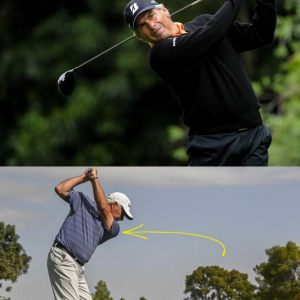In the wake of the U.S. Women’s Open in early June, Charley Hull, who was coming off both a top-20 finish at Lancaster (Pa.) Country Club and also a viral moment involving a half-smoked cigarette, was a guest on Dan Le Batard’s popular ESPN Radio show.
Several minutes after Hull had dialed in for the interview, Le Batard’s cohost, Jon Weiner, who goes by the nickname “Stugotz,” said to Hull, “I want to ask you a serious question. How many cigarettes per round do you—”
Here, Le Batard jumped in, saying, “Stop with the cigarettes! I promised her at the beginning that we wouldn’t wear her out with the cigarettes.”
But Stugotz, himself a smoker, pressed on.
“—because, Dan, it’s leading to something. I want to quit. She wants to quit. I want to quit with her. I think we’re going to make a pact here.”
Hull told Stugotz that she smokes five cigarettes per round, but the exchange revealed much more than just the extent of her habit — namely that the 28-year-old Brit and the team that represents her clearly want Hull to be known for much more than just her nicotine addiction, and understandably so.
This, of course, is the problem with virality: Once the internet brands you (and we should note here that Hull’s viral moment originated with a GOLF.com social post), for better or worse that affiliation can be tough to shake. Take the Solheim Cup last week. When a reporter posted a video of Hull cozying up to the rope line and borrowing a fan’s lighter, Golf Twitter gobbled it up; Barstool Sports also got in on the action, publishing an article that dubbed Hull the “People’s Golfer” and described her lighting up mid-round as “the coolest damn thing you ever did see.” The dart, the aviator shades, Hull’s glam: it all just kind of works together. Even at the Paris Olympics, where smoking was banned, Hull’s habit became a story line. The question on reporters’ minds: How would not getting her fix influence Hull’s play?
But if that’s the bad, here’s the good: the mass curiosity in Hull’s smoking has undoubtedly helped raise her profile (662,000 Instagram followers and counting) and marketability during a season when her game also has been in form. Even though Hull hasn’t won this year, she’s been on the kind of run that suggests a W is imminent: four top-25 finishes in the five majors, three other top-10 finishes and a Europe-best three-win week at the Solheim Cup that included a 6-and-4 dismantling of world No. 1 Nelly Korda. “I can’t believe she’s not already [a major champion],” four-time major winner Laura Davies crowed after Hull’s singles match. “She’s so talented.”
Hull is a lot of other things, too, many of which have also bolstered her Q-rating. For one, she’s an open book, probably far more open than her IMG minders would like. On Le Batard’s show, she let slip that she had split with her boyfriend the week before the U.S. Open. In a Telegraph interview earlier this year, she revealed she’s had lip fillers. “I’ve had half a mil in my lips, but so have many girls my age,” she said.
Years ago, when she was selected as a captain’s pick to play in her first Solheim Cup — she was only 17 then — she said she remembered feeling “disappointed” because she had “a birthday party I was meant to be going to that weekend.” At that same Solheim Cup, though, Hull quickly became a media favorite for her candor. Asked about her steely teammate Suzann Pettersen, who was seated next to Hull in a group press conference, Hull said: “She’s really experienced, but she’s not really that old, to be honest. I meant that in a nice way. Next question, please.”
That’s Hull, and always has been. Growing up in Northamptonshire, England, Hull dropped out of school when she was 12; her parents, Dave, a plasterer, and mother, Basienka, who was an accomplished tennis player, elected to homeschool their daughter, though it’s unclear how much schooling actually took place. “I didn’t do any school work when I left school, I just played golf,” Charley told Golf Monthly in 2020, referring to the many hours she logged at Kettering Golf Club. “Usually people would be at school from 9 a.m. to 3 p.m.; I was playing golf from 9 a.m. to 3 p.m. every day. I was playing with the lads down at the golf club because they sometimes skived off school to play with me and we just had a few games. A few of them were a lot older than me.”
Features
Charley Hull is set to compete in her seventh Solheim Cup.
Hostile Solheim Cup crowds? Charley Hull says bring ’em on
By: Dylan Dethier
Her first coach wasn’t big on technique, instead encouraging Charley to smash the ball as hard as she could. By 11, she was playing to scratch. Her first big win came at the English Girls Under-13 Championship, followed by a couple of titles in the U.S. against top American juniors. After winning both the Welsh and English Amateurs in 2011, Hull turned pro as a 16-year-old. A year later, she made the Solheim Cup team, her first of what has now been seven Solheim appearances in which she has cumulatively accumulated 16.5 points. Only seven players in history — on either side — have amassed more points.
If Hull exudes John Daly vibes, it’s not only because of her taste for tobacco and penchant for calling things as she sees them. Like Daly, Hull also subscribes to playing quickly and gripping and ripping her way around the course. Perhaps no moment personified this approach more than a shot the faced in the decisive moments of the U.S. Women’s Open at Pebble Beach last year. Partly stymied by the tree in the middle of the 18th fairway, Hull talked through her options with her caddie, Adam Woodward, before ultimately deciding, as she put it in her charmingly homespun way, “Shy kids don’t get the sweets.” Translation: No risk, no reward. With a trunk in front of her and branches above her, she blasted a drawing fairway wood that for a moment looked like it might trundle up to the green. It didn’t, curling into a bunker instead, but the shot was emblematic of how Hull plays the game and, for that matter, lives her life.
Another topic that Hull has been open about: her Attention Deficit Hyperactivity Disorder, with which she was diagnosed in 2023. Hull has said the condition can make her impatient and “cut-offish,” but that competitive golf is an elixir as it requires intense focus. Daily gym visits, where she grinds out famously grueling workouts, are also beneficial. So, too, she has said, is drinking copious amounts of water. The cigarettes are another helpful distraction. “I now know what to do,” she said last year, “so I manage it loads better.”
After her lights-out performance against Korda in Virginia, Hull was right back on the job, hopping a flight to New York City for some sponsor and media appearances and then to Cincinnati for this week’s LPGA event, the Kroger Queen City Championship. The Solheim had been a long and exhausting week for Hull, just as it had been for all the players. Four-thirty a.m. wake-up calls. Shuttle rides. Press scrums. A continent on your shoulders. “And then the adrenaline from the weekend,” Hull said earlier this week from the Kroger. “Obviously, I played all five matches, I had loads of adrenaline and now I feel like I am in a bit of a comedown because I’m just so tired.” But not just tired. “Absolutely shattered,” Hull said.
She’s hanging in there, though. Hull made the cut by three on Friday, and at four under for the tournament is seven back of Lydia Ko’s lead. This might not be the week when she picks up her first LPGA win since the fall of 2022, but then again, who knows?
With Hull, you never know what’s coming next.





